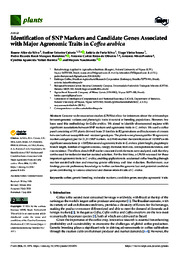Identification of SNP markers and candidate genes associated with major agronomic traits in coffea arabica.
Identification of SNP markers and candidate genes associated with major agronomic traits in coffea arabica.
Autoria: SILVA, R. A. da; CAIXETA, E. T.; SILVA, L. de F.; SOUSA, T. V.; OLIVEIRA, A. C. B. de; PEREIRA, A. A.; BARRETO, C. A. V. B.; NASCIMENTO, M.
Resumo: Genome-wide association studies (GWASs) allow for inferences about the relationships between genomic variants and phenotypic traits in natural or breeding populations. However, few have used this methodology in Coffea arabica. We aimed to identify chromosomal regions with significant associations between SNP markers and agronomic traits in C. arabica. We used a coffee panel consisting of 195 plants derived from 13 families in F2 generations and backcrosses of crosses between leaf rust-susceptible and -resistant genotypes. The plants were phenotyped for 18 agronomic markers and genotyped for 21,211 SNP markers. A GWAS enabled the identification of 110 SNPs with significant associations (p < 0.05) for several agronomic traits in C. arabica: plant height, plagiotropic branch length, number of vegetative nodes, canopy diameter, fruit size, cercosporiosis incidence, and rust incidence. The effects of each SNP marker associated with the traits were analyzed, such that they can be used for molecular marker-assisted selection. For the first time, a GWAS was used for these important agronomic traits in C. arabica, enabling applications in accelerated coffee breeding through marker-assisted selection and ensuring greater efficiency and time reduction. Furthermore, our findings provide preliminary knowledge to further confirm the genomic loci and potential candidate genes contributing to various structural and disease-related traits of C. arabica.
Ano de publicação: 2024
Tipo de publicação: Artigo de periódico
Unidade: Embrapa Café
Palavras-chave: Agronomic traits, Coffea arabica var. arabica, Genetic markers, Plant breeding
Observações
1 - Por padrão são exibidas publicações dos últimos 20 anos. Para encontrar publicações mais antigas, configure o filtro ano de publicação, colocando o ano a partir do qual você deseja encontrar publicações. O filtro está na coluna da esquerda na busca acima.
2 - Para ler algumas publicações da Embrapa (apenas as que estão em formato ePub), é necessário ter, no celular ou computador, um desses softwares gratuitos. Sistemas Android: Google Play Livros; IOS: iBooks; Windows e Linux: software Calibre.
Acesse outras publicações
Acesse a Base de Dados da Pesquisa Agropecuária (BDPA) para consultar o acervo completo das bibliotecas da Embrapa.

